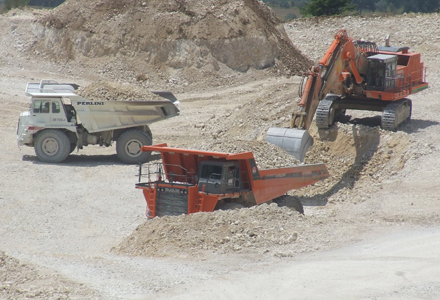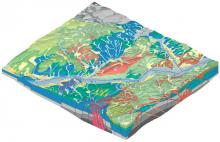Efforts to improve energy efficiency in any quarry will be furthered by a new EU-funded project now underway. Madrid-based consulting firm Solintel is leading a new €6.3million research and development project, which is part funded by the EU, to find new techniques for modelling and applying energy efficiency improvements for every aspect of quarrying.

RSSClaire Symes reports on energy efficiency aims for Europe's quarries
Efforts to improve energy efficiency in any quarry will be furthered by a new3287 EU-funded project now underway. Madrid-based consulting firm 4096 Solintel is leading a new €6.3million research and development project, which is part funded by the EU, to find new techniques for modelling and applying energy efficiency improvements for every aspect of quarrying.
The company is working with 11 specialist companies from across Europe on the four year scheme that not only hopes to come up with new solutions but will put them into practice at four quarries to demonstrate the possibilities.
"The EE-Quarry project comes from the necessity to control a very demanding energy intensive industry, which is characterised by its high energy demands and large CO2 emissions," said Solintel research and development manager Antonio Barona. "The goal is to improve energy efficiency and to reduce CO2 produced by quarries."
Solintel first saw the potential for improving energy efficiency in quarries after carrying out some consultancy work for a quarry operator in southern Spain, which looked at quality and efficiency issues and their impact on productivity. "While we were working on the Spanish quarry project, we noticed there was a call for a project proposer for the energy efficiency and we thought it was a good chance to increase our knowledge of this sector," he said.
Solintel is project managing the scheme but various work packages are being undertaken by the other project partners, who include Spain-based contractor976 Acciona, Spanish quarry operator 4097 CAMT, research organisation CMT, Italian consultant 4098 D'Appolonia, Greek consultant Exergia, UK-based research body 2899 MIRO, explosive specialist 4100 EPC-France (formerly Nitro), Greece's S&B Industrial Minerals, the UK's 4091 University of Leicester and Polish construction company 3304 Mostostal Warszawa.
The scheme's management is organised with a general committee, a steering committee and seven work packages and it is in the work packages that the aim of the project becomes clear.
"Solintel is leading the first work package, which concerns the project management," explained Sanchez. "We are working on the overall coordination and governance structure, as well as the communication flow and methods necessary to achieve the project objectives." The project website - www.ee-quarry.EU - forms a central part of the communication between the partners and also provides great detail into the aims of the overall project.
"CAMT is leading the second work package which is to detect critical and intensive energy demanding processes in the extractive industry and, using energy management system techniques, to provide an optimised solution," continued Sanchez. "This package is a key element of the initial demonstration phase of the work.
"The third package is being led by MIRO and will aim to develop innovative solutions for energy efficiency based on modelling and monitoring all stages involved in the aggregate production process, as well as proposing and validating a set of improvement alternatives, according to the work done on the second work package.
"Increasing energy efficiency opportunities and reducing CO2 impact after production is the focus of the fourth package and is being led by Solintel. This package involves looking at the life cycle of the quarry and considers the CO2 neutralising activities that take place during the restoration phase.
"S&B will lead the fifth package which will look at the implementation benefits of the model," said Sanchez. "The objective here is to demonstrate and apply the solutions developed in the third package of work by using four quarries where operations will be controlled, monitored and evaluated using the systems developed in the second and third work packages. The results will allow us to quantify the real impact and develop the opportunities offered by this project.
"D'Appolonia will lead the sixth package, which will develop the business model and exploit the project results. The final package will be led by the University of Leicester and involves dissemination, education and training in the models developed by the project to ensure maximum benefit in quarries across Europe." Although the project has an EU grant, it does not cover the whole project costs and around 40% of this is being contributed by the project partners. "There are considerable benefits to companies who work closely on this kind of project in terms of networking and gaining new knowledge that can be commercialised in other parts of their businesses," explained Barona. "Contribution to the funding helps to ensure everyone's commitment to the work." The funding from the EU is released sequentially and is linked to the official 18, 36 and 48 month reporting periods which have to demonstrate the progress and results of the project.
RSS
Efforts to improve energy efficiency in any quarry will be furthered by a new
The company is working with 11 specialist companies from across Europe on the four year scheme that not only hopes to come up with new solutions but will put them into practice at four quarries to demonstrate the possibilities.
"The EE-Quarry project comes from the necessity to control a very demanding energy intensive industry, which is characterised by its high energy demands and large CO2 emissions," said Solintel research and development manager Antonio Barona. "The goal is to improve energy efficiency and to reduce CO2 produced by quarries."
Solintel first saw the potential for improving energy efficiency in quarries after carrying out some consultancy work for a quarry operator in southern Spain, which looked at quality and efficiency issues and their impact on productivity. "While we were working on the Spanish quarry project, we noticed there was a call for a project proposer for the energy efficiency and we thought it was a good chance to increase our knowledge of this sector," he said.
Solintel is project managing the scheme but various work packages are being undertaken by the other project partners, who include Spain-based contractor
The scheme's management is organised with a general committee, a steering committee and seven work packages and it is in the work packages that the aim of the project becomes clear.
"Solintel is leading the first work package, which concerns the project management," explained Sanchez. "We are working on the overall coordination and governance structure, as well as the communication flow and methods necessary to achieve the project objectives." The project website - www.ee-quarry.EU - forms a central part of the communication between the partners and also provides great detail into the aims of the overall project.
"CAMT is leading the second work package which is to detect critical and intensive energy demanding processes in the extractive industry and, using energy management system techniques, to provide an optimised solution," continued Sanchez. "This package is a key element of the initial demonstration phase of the work.
"The third package is being led by MIRO and will aim to develop innovative solutions for energy efficiency based on modelling and monitoring all stages involved in the aggregate production process, as well as proposing and validating a set of improvement alternatives, according to the work done on the second work package.
"Increasing energy efficiency opportunities and reducing CO2 impact after production is the focus of the fourth package and is being led by Solintel. This package involves looking at the life cycle of the quarry and considers the CO2 neutralising activities that take place during the restoration phase.
"S&B will lead the fifth package which will look at the implementation benefits of the model," said Sanchez. "The objective here is to demonstrate and apply the solutions developed in the third package of work by using four quarries where operations will be controlled, monitored and evaluated using the systems developed in the second and third work packages. The results will allow us to quantify the real impact and develop the opportunities offered by this project.
"D'Appolonia will lead the sixth package, which will develop the business model and exploit the project results. The final package will be led by the University of Leicester and involves dissemination, education and training in the models developed by the project to ensure maximum benefit in quarries across Europe." Although the project has an EU grant, it does not cover the whole project costs and around 40% of this is being contributed by the project partners. "There are considerable benefits to companies who work closely on this kind of project in terms of networking and gaining new knowledge that can be commercialised in other parts of their businesses," explained Barona. "Contribution to the funding helps to ensure everyone's commitment to the work." The funding from the EU is released sequentially and is linked to the official 18, 36 and 48 month reporting periods which have to demonstrate the progress and results of the project.
RSS








